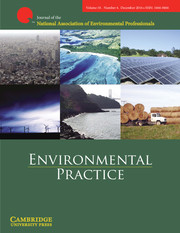Article contents
RESEARCH ARTICLE: Rent-Seeking Obstacles to Changing Environmental Practices and Sustainable Public Procurement in China
Published online by Cambridge University Press: 19 September 2013
Abstract
Over the last 30 years China has enjoyed economic growth averaging about 10% of gross domestic product (GDP) per year. But this economic growth has come at a high environmental cost. In China approximately 750,000 premature deaths a year are attributed to high levels of environmental pollution. With the recent 12th Five Year Plan (FYP) China's leadership announced the launching of a green revolution that would balance the need for robust economic growth with concern for the environment and combating climate change. This paper utilizes a rent-seeking framework to explore some of the obstacles inhibiting more environmentally sustainable policies in China. We describe the situation as a struggle over the proper aligning of the individual actor's behavior within an opportunistic governance structure, and we argue that rent seeking and corruption creates substantial hurdles to promoting green environmental practices and programs.
Environmental Practice 15:240–252 (2013)
- Type
- Features
- Information
- Copyright
- Copyright © National Association of Environmental Professionals 2013
References
- 5
- Cited by




